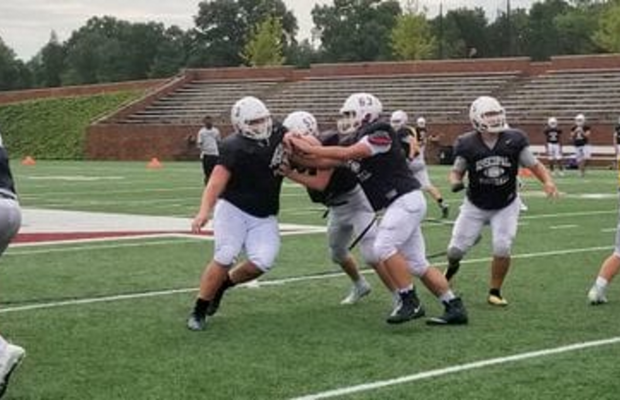For Episcopal’s international players, football is a way to learn about America

Two years ago, freshman David Zeng got a cramp in his leg on the third day of training camp. The problem wasn’t that he could barely walk at that moment. It was that he didn’t know how to tell people he had a cramp. Hailing from Guangzhou, China, Zeng had only been at Episcopal High School, and the United States, for about a week and did not speak fluent English. He didn’t know the word “cramp.”
“People were asking me what I was doing, and I pointed to my leg and just said ‘hurts,’” Zeng said. “Looking back, it’s pretty funny.”
Zeng is now a junior, with much-improved English, and plays mostly defensive lineman for the Maroon. He is one of seven students on Episcopal’s varsity football team from another country. Those international students’ backgrounds vary, but they are unified by a sport that is foreign to non-Americans and even looked down upon by some for its violent hits.
Episcopal is a private boarding school in Alexandria with a student population of 445. The school prides itself on its diversity: More than 10 percent of its students come from outside the United States, from 14 different countries.
On the football team, which is 2-0 entering Friday’s game versus Collegiate School, the seven international students are from China, France and Canada — three countries where American football isn’t most prominent. Their reasons for joining the team differ, but all of them say they love the sport.
“One thing I really love about football is the sense of responsibility that players have,” said lineman Mike Yang, who is from Beijing. “When you play soccer or basketball, there could be one player who’s really good and carry the whole team. That doesn’t happen in football. Even if the quarterback is really good, you want to have a good receiver and linemen that block well or else it wouldn’t work well. After a whole day of studying, I’m usually tired, but playing football makes me feel relieved,” right guard Leo Kong, of Shanghai, said. “When you’re on the field hitting someone, it gives you a different feeling.”
But in adopting the sport, the international players have had hiccups — from the language barrier to simply not knowing the rules.
“In one of the first games I played last year in JV, I was a left guard. A defensive lineman held my back and I shouted ‘Holding!’ to the ref,” Yang said. “Afterwards, people told me there’s no holding for defense. It’s only a rule for O-line.”
Tackle Christos Backos was exposed to football as a child in Paris and Athens, but putting on pads and stepping on the field for the first time in the United States was different.
“It was a big challenge because most of these kids have been playing football since the age of 7 or 8,” Backos said. “A lot of them have committed to [Division I] schools already, so it was really challenging, but they would teach me after practice.”
Despite the learning curve, football has transformed their lives in many aspects. Physically, they have become more fit and active. The sport also helped them assimilate to American culture.
They have learned life lessons through the sport, as well.
“When you’re about to quit, you have to push yourself a little bit more,” Zeng said. “Before, I wouldn’t do that. I learned to get into the mind-set of pushing myself.”
The coach tasked with leading Episcopal’s diverse roster, which has athletes who will play at Notre Dame and Stanford next year along with those who picked up football within the past year, is Mark Moroz. The first-year coach is, fittingly, from Canada, and his appreciation of football is the main reason he moved to the United States.
“What a lot of these guys are dealing with, I went through, too,” said Moroz, who, like many Episcopal faculty members, lives on campus, allowing him to meet with players outside of practice, including watching football with them in the commons. “You don’t have to be a five-star recruit to be on our program. I just want to make it my priority as a coach to have an environment where everyone feels welcomed to at least give it a try.”